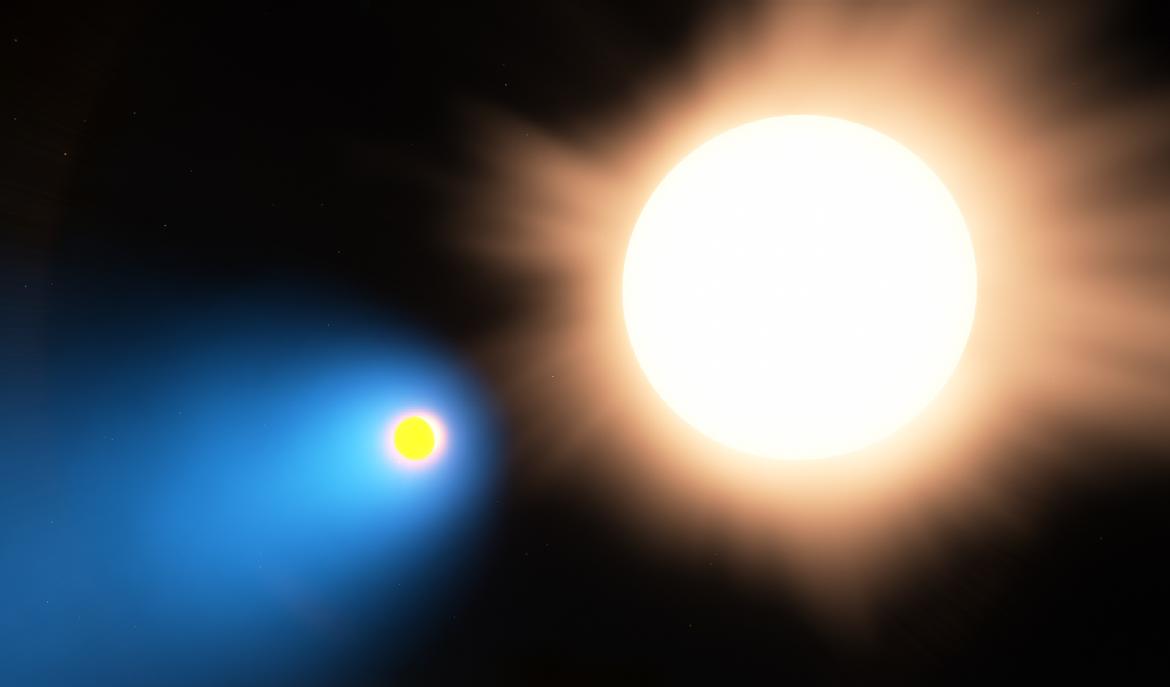Jorge Fernández Fernández
I am a postdoctoral researcher in the Astronomy and Astrophysics group at the University of Warwick working with Prof. Peter Wheatley. I am studying how the evolution of close-in exoplanets is affected by the X-rays emitted by their host stars.
I am also the Operations Manager of the Next Generation Transit Survey (NGTS), a first-class astronomical observatory located at the ESO Paranal Observatory in northen Chile. You can learn more about NGTS on our website and on Wikipedia.

Top figure: depiction of LTT 9779 b, an extremely close-in exoplanet, evaporating its atmosphere into space. Image credit: SpaceEngine, Cosmographic Software LLC.
Research Interests
The Kepler mission has uncovered a surprising number of planets between Earth and Neptune in size that are not present in our Solar System. The masses and sizes of some of these planets are consistent with a solid rocky core surrounded by a large H-rich envelope (mini-Neptunes) that can double the planet's radius and yet comprise less than a percent of its mass; whereas others are most likely entirely rocky (super-Earths). These two populations appear as two distinct peaks in the radius distribution of Kepler planets, the Radius Gap, which is though to arise due to the evaporation of these envelopes. This phenomenon has been directly observed in Lyman-α and helium triplet transits, in which the extended atmosphere occults a larger amount of stellar photons than expected given the planet's optical radius.
Photoevaporation is a proposed mechanism for evaporation, where high energy radiation emitted by their host stars, namely X-rays and extreme ultraviolet radiation (together XUV), is readily absorbed by the upper layers of the planet's atmospheres. This causes the envelopes to heat-up and expand, with the subsequent escape of material from the planet's gravitational well.
My research focuses on studying the extent to which photoevaporation influences the evolution of young close-in mini-Neptunes and super-Earths.
Publications
First Author
- Survival in the Neptune desert: LTT 9779 b kept its atmosphere thanks to an unusually X-ray faint host star. J. Fernández Fernández, P. J. Wheatley, G. W. King, J. Jenkins. doi:10.1093/mnras/stad3263
- The shared evaporation history of three sub-Neptunes spanning the radius-period valley of a hyades star. J. Fernández Fernández, P. J. Wheatley, G. W. King. doi:10.1093/mnras/stad1257.
- X-ray irradiation of three planets around Hyades star K2-136Link opens in a new window. J. Fernández Fernández and P. J. Wheatley, 2021, doi:10.1002/asna.20210076 (proceedings article).
Contributing Author
- Stringent Upper Bounds on Atmospheric Mass Loss from Three Neptune-Sized Planets in the TOI-4010 System. Morgan Saidel, Shreyas Vissapragada, Michael Zhang, Heather A. Knutson, Matthäus Schulik, Jorge Fernández Fernández, et al. 2025.
- K2-370 b: a strongly irradiated sub-Neptune transiting a very active solar-type star. A. Sozzetti, M. Damasso, J. Fernández Fernández, et al. 2024.
- Surviving in the Hot Neptune Desert: The Discovery of the Ultra-Hot Neptune TOI-3261b. Emma Nabbie, Chelsea X. Huang, Jennifer Burt, David J. Armstrong, Eric E. Mamajek, Vardan Adibekyan, Sergio G. Sousa, Eric D. Lopez, Daniel Thorngren, Jorge Fernández Fernández, et al . 2024. doi: 10.3847/1538-3881/ad60be
- TOI-2374 b and TOI-3071 b: two metal-rich sub-Saturns well within the Neptunian desert. Alejandro Hacker, Rodrigo F. Díaz, David J. Armstrong, Jorge Fernández Fernández, et al. 2024. doi:10.1093/mnras/stae1420
- The XUV-driven escape of the planets around TOI-431 & ν2 LupiLink opens in a new window. King, George W. ; Corrales, Lía R. ; Fernández Fernández, Jorge, et al. 2024. doi: 10.48550/arXiv.2404.10673.
- TOI-332 b: a super dense Neptune found deep within the Neptunian desert. Osborn, Ares ; Armstrong, David J. ; Fernández Fernández, Jorge; et al. 2023. doi:10.1093/mnras/stad2575
- TOI-908: a planet at the edge of the Neptune desert transiting a G-type star. Faith Hawthorn, Daniel Bayliss, David J. Armstrong, Jorge Fernández Fernández, et al. 2023. doi:10.48550/arXiv.2306.09758.
- TOI-2498 b: A hot bloated super-Neptune within the Neptune desert. Frame, Ginger ; Armstrong, David J. ; Cegla, Heather M. ; Fernández Fernández, Jorge ; et al. 2023. doi:10.48550/arXiv.2305.06950.
- The young mini-Neptune HD 207496b that is either a naked core or on the verge of becoming oneLink opens in a new window. Barros, S. C. C. ; Demangeon, O. D. S. ; Armstrong, D. J. ; Delgado Mena, E. ; Acuña, L. ; J. ; Fernández, Fernández; et al. 2023. doi:10.1051/0004-6361/202245741.
-
Discovery of an Edge-on Circumstellar Debris Disk Around BD+45° 598: a Newly Identified Member of the β Pictoris Moving Group. S. Hinkley et al., 2021, The Astrophysical Journal, Volume 912, Issue 2, id.115,
11 pp.
Conferences / Workshops
Talks
- UKEXOM 2023 (UCL, London, UK). Surviving in the Neptune desert.
- Towards Other Earths III (Porto, Portugal). Surviving in the Neptune desert.
- New Results in X-ray Astronomy (Leicester, May 2022). The evaporation history of three planets around K2-136.
- XMM-Newton 2021 Science Workshop (Online, May 2021). Analysis of X-ray driven atmospheric loss on three-planet system K2-136.
- STFC Introduction to Astronomy (Online, January 2021). Analysis of X-ray driven atmospheric loss on multiplanetary system K2-136. Link to presentation here.
Poster presentations
- UKEXOM 2024 (Birmingham, UK) - The role of X-ray variability in shaping the period-radius valley
- Exoclimes IV (Exeter, UK) - Surviving in the Neptune Desert (Poster link)
- Protostars and Planets VII (Kyoto, Japan) - Surviving in the Neptune Desert (Poster link)
- Planet-ESLAB (ESTEC, Netherlands) - Surviving in the Neptune Desert (Poster link)
- National Astronomy Meeting (University of Warwick, 2022) - X-ray irradiation of three planets around Hyades star K2-136
- UKEXOM (Edinburgh, 2022) - X-ray irradiation of three planets around Hyades star K2-136
Attended
- Athena UK Science Meeting (Leicester, May 2022)
- ESCAPE Data Science Summer School (Online, June 2021)
- UKEXOM (Online, April 2021)
Education
- Astrophysics, PhD. University of Warwick (2020-2024). "Studying the extent to which X-ray photoevaporation affects the evolution of exoplanet atmospheres". Supervised by Prof. Peter Wheatley.
- Physics with Astrophysics, MPhys. University of Exeter (2016-2020). Integrated Masters program, combining a 3-year bachelors degree with a final year masters dissertation. "Direct Imaging of Exoplanets & Circumstellar Discs". Supervised by Dr. Sasha Hinkley.
Teaching
- PX129 (Physics Tutorial)Link opens in a new window, PX146 (Key Skills for Physicists) - First year physics problem classes (2020-2023). Marking problem sheets, assessing the progress of undergraduate students, and delivering a teaching session twice a week both in online and face-to-face formats.

Write to:
Jorge Fernández Fernández,
